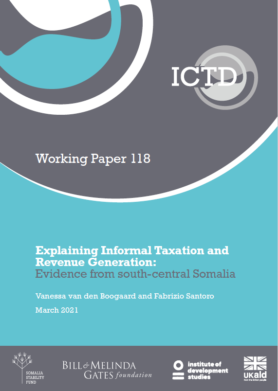Working Paper 118
Most people in low-income countries contribute substantially to the financing of local public goods through informal revenue generation (IRG). However, very little is known about how IRG works in practice. We produce novel evidence on the magnitude and regressivity of IRG and its relationship with the state in a fragile context, Somalia. We rely on original data from surveys with over 2,300 households and 117 community leaders in Gedo region, as well as on extensive qualitative research.
We first show that IRG is prevalent. Over 70 per cent of households report paying at least one informal tax or fee in the previous year, representing on average 9.5 per cent of annual income. We also find that, among households that contribute, poorer ones contribute larger amounts than richer ones, with higher incidence in relation to their income. Further, in line with theory and expectations, informal payments have inequitable community-level effects, with individuals in wealthier communities making more informal payments than in poorer ones and, correspondingly, having access to a greater number of public goods.
We then consider four explanations for the prevalence of IRG. First, IRG clearly fills gaps left by weak state capacity. Relatedly, we show that IRG can bolster perceptions and legitimacy of the state, indicating that sub-national governments may actually benefit from informal taxation. Second, informal taxing authorities are more effective tax collectors than the state, with informal taxing authorities having greater legitimacy and taxpayers perceiving informal payments to be fairer than those levied by the state. Third, dispelling the possibility that informal payments should be classified as user fees, taxpayers overwhelmingly expect nothing in return for their contributions. Fourth, in contrast to hypotheses that informal payments may be voluntary, taxpayers associate informal payments with punishment and informal institutions of enforcement.
Our research reinforces the importance of IRG to public goods provision in weak formal institutional contexts, to everyday citizens, and to policymakers attempting to extend the influence of the federal state in south-central Somalia. Foremost, informal tax institutions need to be incorporated within analyses of taxation, service delivery, social protection, and equity. At the same time, our findings of the complementary nature of IRG and district-level governance and of the relative efficiency of revenue generation by local leaders have important implications for understanding statebuilding processes from below. Indeed, our findings suggest that governments may have little incentive to extend their taxing authority in some fragile contexts.

